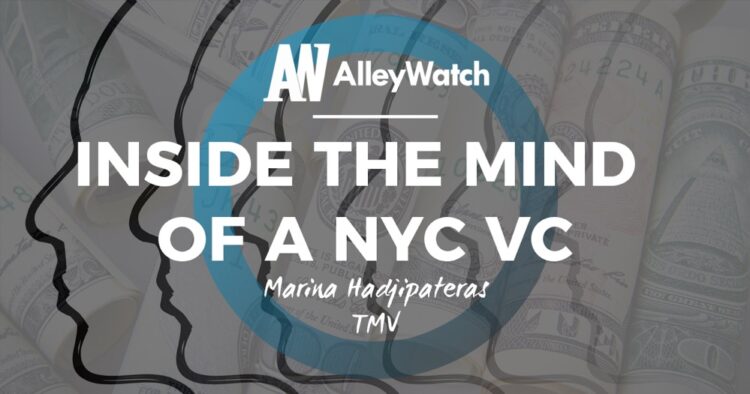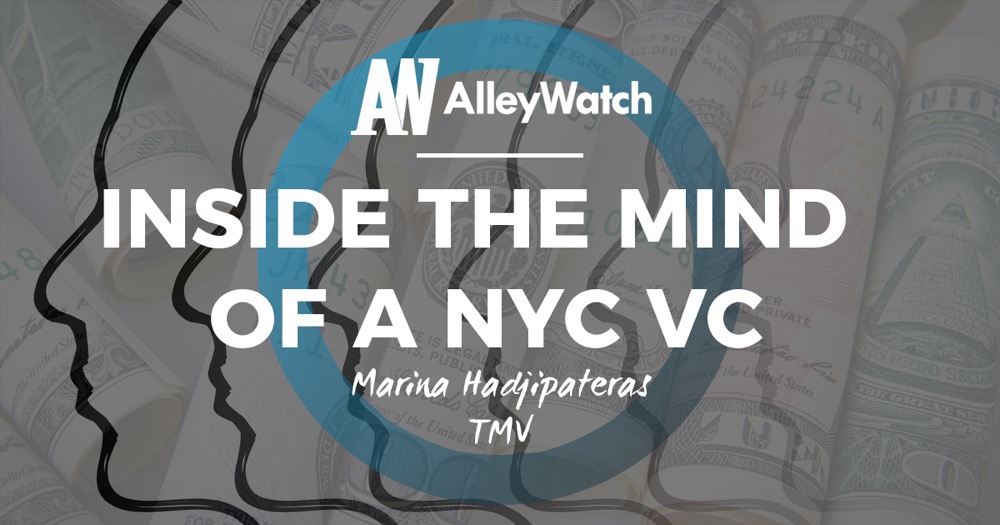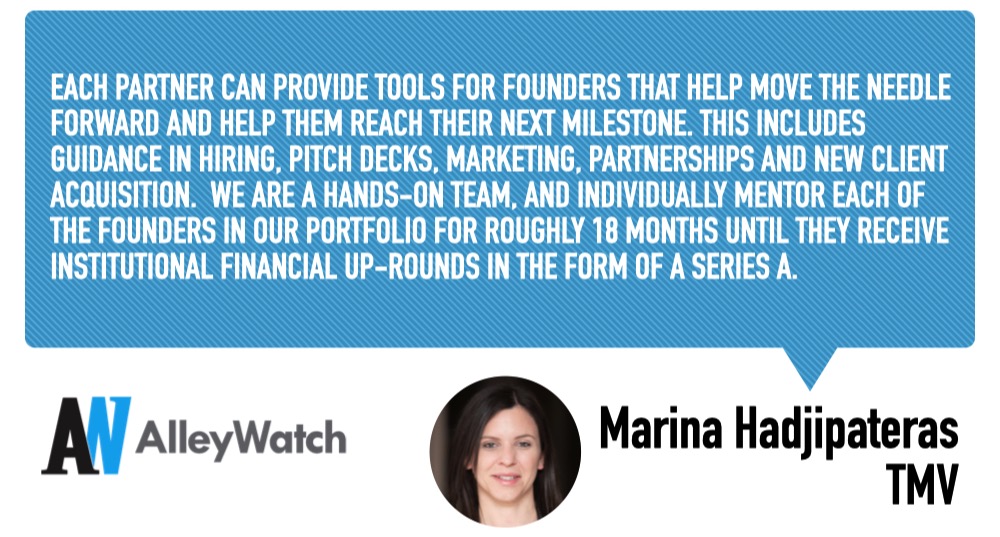Welcome back to Inside the Mind of an NYC VC, a highly acclaimed series at AlleyWatch in which we speak with leading New York City-based Venture Capitalists. Today we sit down with Marina Hadjipateras, Cofounder and General Partner at TMV, an early-stage venture firm focused on investing in purposeful companies that are reimagining the future. The firm has a number of core focus areas across the future of work, logistics and mobility, sustainable solutions, care economy, and edtech. Since the launch of its first fund in 2016, TMV has built a diverse portfolio that includes companies like Parsley Health, Ridwell, Classtag, Kindbody, Andie, and Bulletin.
Marina was kind enough to provide some candid insight into her path to venture from the shipping industry, tips for aspiring venture capitalists to break into the industry, how TMV works closely with portfolio companies, what the firm is looking for in its investments, and much, much more…
If you are a NYC-based VC interested in participating in this series, please send us an email. We’d love to chat.
Reza Chowdhury, AlleyWatch: Please tell us a little bit about background and how/why you started in venture.
Marina Hadjipateras, TMV: I am an operator. I spent most of my career prior to venture in maritime shipping—working for my family’s 200+-year-old business. As a child, I was mentored by my grandmother; she was a pioneer, one of the first and only women to rise through the ranks of a male-dominated industry. I was driven and deeply inspired by her strength, industriousness, and bravery.
After graduating from Georgetown University and earning my “Seaman’s License” from The United States Merchant Marines Academy, I moved to South Korea to get hands-on experience. It was in Korea that I began to fundamentally understand the disparate elements of the business. It was the most incredible and intense crash course I could have experienced.
Around that time I also joined the Environmental Committee for Shipowners, Intertanko, believing (as I always have) that moving forward in any age-old industry means being at the forefront of both innovation and sustainability. After all, we only have one earth.
I moved to Greece, and later, London, then back to New York to lead the in-house IR roadshow for the Dorian LPG IPO, where we successfully IPOed on the NYSE.
It was at that point that I began to see a critical need to bridge the gap between heritage industries and new technology. This led me first into investing, and then venture capital. I launched our Family Office and reconnected with Soraya Darabi, whom I knew from my undergraduate days at Georgetown University.
Soraya is a well-known serial entrepreneur and successful angel investor, who at that time was ready to make her next professional move into venture. After helming a startup with an exit and working for another that sold, we discovered how well our distinctive and different backgrounds complemented each other—and in 2016, TMV came to life. We’ve now been partners for almost 5 years and have raised 2 funds and 3 SPVs together.
 Your path to venture is a bit unconventional. What tips do you have for those aspiring to get into the business and specifically early-stage VC?
Your path to venture is a bit unconventional. What tips do you have for those aspiring to get into the business and specifically early-stage VC?
Stay in the know, especially on all things regarding innovation in your industry. Network, network, network and build relationships whenever and however you can— to best understand how to connect and identify a unique value that you can offer to founders, one that differentiates you from other VCs; there are a lot of new funds out there. At TMV we are all former operators, and we believe that you can’t give wise counsel if it doesn’t come from a place of purpose and experience.
My advice? Build something! Go for the startup. Start a startup. Venture will be here when you’re ready, and nothing will replace the trial by fire experience that a startup can offer.
Aim to angel invest in 3 companies at a minimum, just to get your feet wet (no matter what the size of the check.)
As a first-time fund manager, what was the fundraising process like for TMV? What factors about the fund do you believe led your limited partners to invest?
Raising capital isn’t easy, as anyone who has raised a fund well knows. It’s also a long process—18 months on average.
We were fortunate to have two successful track records to reference – not to mention a vast network that catapulted us into a position where we were able to achieve a first close quite swiftly. At that point, we hit pause on our raise and began building our track record for Fund I. This then allowed LPs that joined later in the process to see our initial investments, and their evolution, in order to get to know us gradually.
As anyone who has taken part in it knows, fundraising is a skill not unlike sales, and we aim to be authentic saleswomen. Getting to know investors takes time, but now we have the world’s greatest team of extraordinary LPs and can’t wait for more to join along the way.
The firm recently rebranded to TMV from Trail Mix Ventures. Please tell us about the motivating factors behind this decision.
We shortened our name because as a woman-owned firm, we wanted to ensure that we were perceived as a purpose-driven financial institution, not only a brand.
Is there a specific investment thesis that TMV deploys? Where is the firm’s sweet spot?
TMV invests in tech-enabled solutions centered around care, the future of work, education technology, logistics and mobility, and sustainability.
We primarily invest in the US, however, we are also equipped to invest in Europe.
Our investments are at the seed stage, with checks starting at $500K and targeting ownership of at least 10%.
We have curated a remarkable team of people. To that end, we make it a point to invest in companies that reflect the diversity of the world at large; our portfolio is evenly split between male and female, with a further diverse founder makeup.
The firm really works closely with portfolio companies from infancy when things are messy to product-market fit. What resources are available to founders beyond the capital infusion to navigate the choppy waters?
The TMV team itself is also diverse, made up of successful operators who have gone from idea to exit 6 times over. Each partner can provide tools for founders that help move the needle forward and help them reach their next milestone. This includes guidance in hiring, pitch decks, marketing, partnerships, and new client acquisition. We are a hands-on team, and individually mentor each of the founders in our portfolio for roughly 18 months until they receive institutional financial up-rounds in the form of a Series A. To date, we have been marked up from Sequoia Capital, Kleiner Perkins, Foundation Capital, Google Ventures, NEA, and Forerunner, to name a few well-known funds who inspire us.
What are you excited about right now, from an investment standpoint?
The digitization of legacy businesses!
What are the things you look to gain both qualitatively and quantitatively when evaluating a potential investment?
Since its inception, TMV has built a vehicle to invest early in diverse, forward-looking brands with promising missions that have proven to be pandemic and recession-proof.
Given our stage of investment, we look at founders as potential partners. We invest in people first, founders with integrity, grit, and purpose. Quantitatively, we like to see early monetization efforts and data around user traction that can lead to a thoughtful thesis. We look for robust business models and well laid-out strategies.
We invest in people first, founders with integrity, grit, and purpose. Quantitatively, we like to see early monetization efforts and data around user traction that can lead to a thoughtful thesis. We look for robust business models and well laid-out strategies.
What is one thing that many founders are missing, not emphasizing enough, or not aware of when pitching?
Confidence. There is a confidence gap between male and female founders that we are working to resolve, however, it is a critical reason why women founders remain underfunded.
There is a confidence gap between male and female founders that we are working to resolve, however, it is a critical reason why women founders remain underfunded.
Finish this sentence – in 10 years, the NYC Startup ecosystem will be…
An equal playing field for entrepreneurs from all backgrounds.
What behavioral shifts resulting from COVID do you think will remain when this is over, specifically related to your investment areas?
Overall, COVID-19 has expedited what was already beginning to happen: mainstream adoption of technology along various vertices, including legacy industries such as healthcare and work.
Sustainability has already been top of mind and COVID-19 only further emphasizes the need to consider the health of the environment—both people and planet—across all industries.
This consideration is at the core of TMV’s thesis and we have been actively pursuing founders who are looking to move the world in a positive direction.
What’s the last book you read and what are you binge-watching?
Machine Platform Crowd and I have been watching The Undoing. What an ending!
Do you have Zoom fatigue yet?
Not yet!
You are seconds away from signing up for the hottest list in New York Tech! Join the millions and keep up with the stories shaping entrepreneurship. Sign up today





